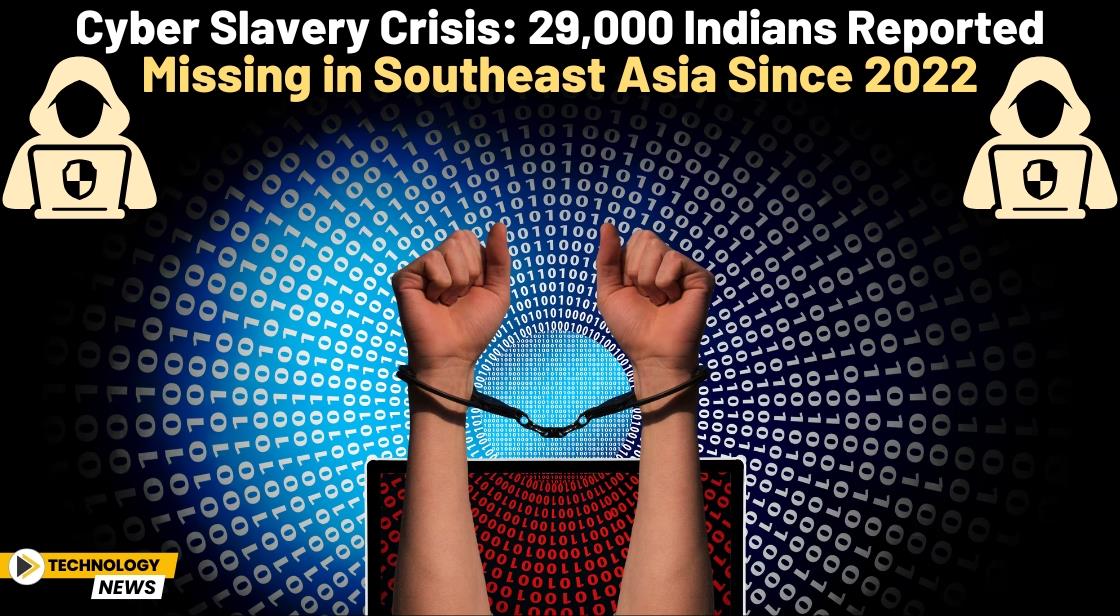Cyber Slavery Crisis: 29,000 Indians Reported Missing in Southeast Asia Since 2022

News Synopsis
According to a recent report titled "Web of Deceit: Understanding Transnational Cyber Slavery and Organized Crime in Southeast Asia", over 29,000 Indians have vanished in Southeast Asia since January 2022. The report suggests that many victims have been drawn into organized crime rings using fake job offers to trap them in a growing form of modern-day slavery—cyber slavery.
These groups predominantly operate out of Cambodia, Laos, and Thailand, using elaborate recruitment tactics to entice vulnerable job seekers from India, Nepal, and Bangladesh with promises of high-paying international jobs.
The Rise of Cyber Slavery in Southeast Asia
How Cybercriminal Networks Operate
Criminal rings in Southeast Asia employ sophisticated digital tools to find and trap their victims. Social media platforms, job portals, and messaging apps like Facebook, Telegram, and WhatsApp are used to post misleading job ads, targeting young people between the ages of 20 and 39 who are eager to improve their financial standing.
These fraudulent job listings often advertise lucrative positions in fields such as "customer service" or "cryptocurrency trading." When candidates arrive, their passports and other identification documents are taken, leaving them stranded in isolated compounds where they are forced into illegal activities, such as phishing, crypto scams, and fake loan fraud.
The Role of Major Criminal Groups in Cyber Slavery
Organized Crime Rings Behind the Scams
The report identifies several high-profile organized crime groups, such as the Jin Bei Group, the Kings Romans Group, and the Prince Group, as being involved in these operations. These organizations take advantage of weak regulatory environments and corrupt officials to sustain their scams.
With access to encrypted platforms, these crime rings evade detection, enabling them to manage extensive cyber scams across borders and target unsuspecting victims globally.
Indian Nationals at Risk of Cyber Slavery
29,000 Missing Indian Nationals from January 2022 - May 2024
From January 2022 to May 2024, over 29,000 Indians who traveled to Southeast Asia for work have gone missing. A significant portion of these individuals traveled on visitor visas, particularly to countries like Thailand, Laos, Cambodia, and Vietnam. The report notes that Thailand accounts for nearly 70% of these missing cases, citing the country’s visa-on-arrival policy, which is exploited by traffickers to transport victims with minimal border scrutiny.
Impact of Cyber Slavery on India and the Global Economy
Financial Losses from Cybercrime
Cyber slavery networks exact a heavy toll on the Indian economy. India reported cyber fraud losses of over Rs 1,750 crore in the first four months of 2024, with many of these scams orchestrated by cyber slavery rings. The report estimates that fraudulent schemes operated by these victims target countries such as the USA, UK, and Australia. In these schemes, coerced laborers are compelled to conduct phishing scams, fraudulent investment solicitations, and romance scams, causing financial losses worldwide.
Inhumane Conditions and Forced Labor
The Harsh Reality of Cyber Slavery Victims
Once lured by these criminal networks, victims are subjected to severe conditions, with their personal freedoms revoked. The report highlights instances of passport confiscation, physical abuse, and psychological manipulation in remote, controlled compounds. Many endure constant monitoring and physical abuse if they resist. In these settings, victims are pressured to achieve daily scam targets, which often include deceptive activities such as cryptocurrency fraud and romance scams.
Tackling the Cyber Slavery Crisis
Challenges in Combating Cyber Slavery Networks
The report underscores the challenge of dismantling these criminal networks due to the complex international scope of the operations and the sophisticated technology traffickers use to avoid detection. Encrypted communication tools, the dark web, and unregulated digital currencies help traffickers evade law enforcement. The report also highlights that the lack of cohesive legal frameworks across borders complicates the task of pursuing and prosecuting offenders.
A Call for International Action and Support for Victims
Strengthening Visa and Border Controls
To combat this crisis, the report advocates for a coordinated global response, including tightening visa regulations and improving border controls. It calls for cross-border law enforcement collaboration to dismantle these networks. Tech companies are also urged to implement more robust monitoring systems to identify and eliminate fake job ads that traffickers use to lure potential victims.
Rehabilitation and Repatriation of Victims
In response to this humanitarian crisis, the report calls for governments and international organizations to establish comprehensive victim support programs. These should include mental health services, legal aid, and repatriation assistance to help victims reintegrate into society. Awareness campaigns targeted at job seekers in countries like India are essential, encouraging them to verify the legitimacy of job offers abroad.
Conclusion
The alarming disappearance of over 29,000 Indian nationals in Southeast Asia is a sobering reminder of the scale of cyber slavery affecting the region. The crisis demands an urgent, comprehensive response, involving stricter regulatory measures, increased public awareness, and international cooperation.
As governments and organizations mobilize to tackle this pressing issue, it remains crucial for job seekers to stay vigilant and verify any overseas employment offers to prevent falling victim to these criminal networks. The report highlights the need for continued efforts in dismantling cyber slavery rings and ensuring that technology is used as a tool for protection rather than exploitation.









